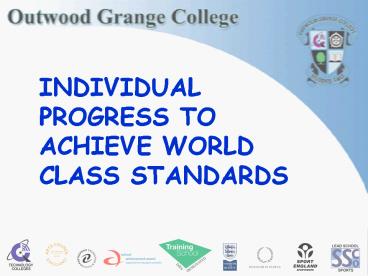INDIVIDUAL PROGRESS TO ACHIEVE WORLD CLASS STANDARDS - PowerPoint PPT Presentation
1 / 19
Title:
INDIVIDUAL PROGRESS TO ACHIEVE WORLD CLASS STANDARDS
Description:
'the best way to achieve world class standards is a system in which all children ... skills and flourish with increased. responsibility. REMINDER. Monday 4th February ... – PowerPoint PPT presentation
Number of Views:22
Avg rating:3.0/5.0
Title: INDIVIDUAL PROGRESS TO ACHIEVE WORLD CLASS STANDARDS
1
- INDIVIDUAL PROGRESS TO ACHIEVE WORLD CLASS
STANDARDS
2
What do we want for our students?
- We want every student to achieve their potential
and enjoy their time at Outwood Grange College
3
The Childrens Plan
- the best way to achieve world class standards
is a system in which all children receive
teaching tailored to their needs and which is
based on their stage not age.
4
How are we going to do this?
- Restructure our curriculum to meet the needs of
all students - Move to Vertical Mentoring Groups 7 to 13 by
2009/10 with a phasing in period next year, Sept
2008, of 7 to 12 - Have a clear Individual Advice and Guidance
(IAG) programme - Highlight the importance of the role of Personal
Mentors in this programme - Provide training and support for ALL staff
- Create individual Pathway Plans with parents
and students in February (Learning Pathway
Planning Day) to be reviewed in October (Learning
Pathway Review Day)
5
Complementarity
VMG
STUDENTS
PLEDGES
CURRICULUM REDESIGN
IAG
6
- Vertical Mentor Groups
- A Rationale
7
Personalising Learning
Complementarity Complements the Proposal for
the new 14-19 curriculum. Stage not Age
Whole school approach to the pastoral system.
WHY?
Create a vertical family of support guidance
Develop students as Leaders, mentors coaches
Improve staff student relationship
Time as a flexible resource
AOTS involved with the students
8
Time as a flexible resource
UCAS applications
2 staff members and a small number of students at
each stage enables us to prioritise time
personalised to the students that need it.
Examinations
Options
Gifted Talented
9
Develop students as Leaders, mentors coaches
- Students paired with a buddy (someone form
another year group). - Advice Guidance at key stages of the year e.g.
Pathways. - Learning to learn mentoring/coaching
homework/coursework - Co-construction on projects (depending on system
selected).
A mixture of youth and experience can be a
positive thing on both sides.
10
Whole College approach to the pastoral system
Students witness first hand how they can
progress through college. Students will be aware
what comes next e.g. exams, learning pathways,
UCAS job applications.
Student teacher relationships personalised with
structured time for individual learning
conversations
More real life experiences. Working with
mixing with students of all ages, gender,
ethnicity, ability disability better
prepares students for later life. Developing
skills such as tolerance, understanding,
listening, Citizenship etc.
Personalised relationships.
11
Student Voice
- Students involved with the research
- School visits.
- Discussion with other school councils.
- Pitch to our school council for feedback.
- Opportunity for students to co-construct the
format.
12
Create an extended family of support
- Research from other schools suggests the impact
of VMGs is - A reduction in bullying older students look
after the younger ones. - Students have more friends in other year groups.
- A greater sense of identity whole college
awareness. - Older students are positive role models when this
type of activity takes place. - Advice filtered down is extremely effective
How to do it right. - Transition from Y6-7 is very smooth straight in
to a family of support with an individual buddy
to help them adapt.
13
Fully Vertical Mentor Groups from years 7 - 13
- Cohort Size (1800 335) 2135
Transition to exclude Y13 for first year.
14
What will Vertical Mentoring Groups FEEL like for
students?
15
Before
After
16
What might vertical mentor groups look like at
Outwood Grange College?
17
VMGs and the International Dimension
OGC divided into 5 schools which could be
continents
South America School Chile Argentina Bolivia Peru
Brazil Paraguay Uruguay Falkland
Islands Columbia Venezuela Ecuador French
Guiana Suriname Guyana Panama Honduras Costa
Rica Nicaragua
Africa School Namibia Chad Ethiopia Sudan Kenya T
anzania South Africa Morocco Ghana Nigeria Ivory
Coast Tunisia Egypt Botswana Malawi Liberia Rwanda
Zimbabwe
School continents are then divided into vertical
mentor groups according to countries within the
continent
18
Will older students have a negative influence on
younger students?
Students from different year groups do mix at
break, lunch, on the bus, before and after
college. Any negative influence is much more
likely to occur then, rather then in a time
that is managed and supervised.
Younger students benefit from the wisdom and
experience of the older students.
Tutor time will be structured, Managed led by
2 members of staff.
Older students develop leadership skills and
flourish with increased responsibility.
19
REMINDER
- Monday 4th February
- Pathway Planning Day
- Have you made your appointment?































